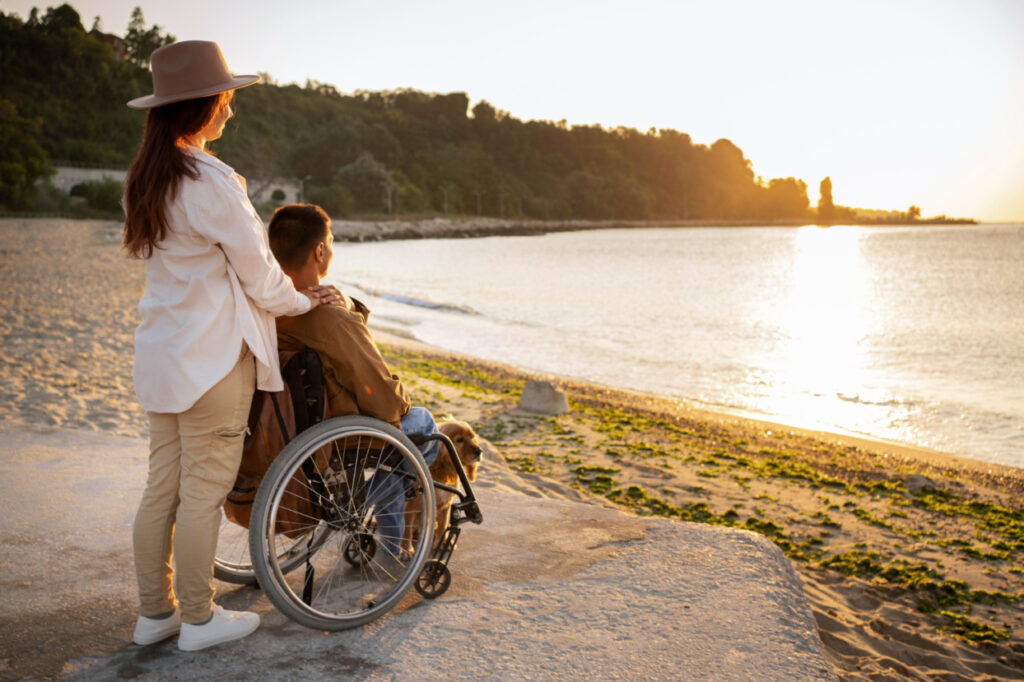In-home care is a service that helps people with a disability live at home comfortably and independently. It means you can reside in a location where you feel at ease while still getting assistance with the activities required on a daily basis.
The person who provides the in-home care will typically be an NDIS Qualified Support worker or sometimes a Nurse depending on your specific needs. This post will explore how In-home care can help NDIS participants live independently in their homes, what tasks they may provide assistance with, and why this service could be beneficial to you or someone you know!
The Benefits of In-Home Care
One of the primary advantages of In-home care is that it gives a sense of warmth and familiarity. Many people feel nervous or afraid in new surroundings, such as hospitals or group homes, but can relax and feel at ease in their own homes with a Support Worker assisting them. This may be significant for persons on the NDIS since it can assist them to maintain their autonomy, and independence and feeling in control of their lives.
In-home care also provides a sense of community for people with disabilities. They can continue to interact with friends and family members who live close by, which is important for maintaining social connections. Support Workers can also provide valuable assistance with daily tasks, such as shopping or cleaning. This can give NDIS participants the opportunity to engage in social activities and feel more confident about making their own decisions on how they want to spend their time each day.
What are you Entitled to When Receiving Home Care?
This will be a question for your NDIS Plan Manager meeting. Every NDIS participant is different, which is why your situation must be assessed carefully to determine what level of support you need. The Plan Manager will discuss with you how many hours per day or week you need assistance and connect you with the right Support Workers depending on your needs.
Domestic Assistance
Domestic Assistance is the most common type of support provided. It entails tasks such as cooking, cleaning and doing the laundry for NDIS participants who need assistance or supervision with these activities. Domestic Assistance can make your life easier by freeing up your time so you can focus on other things, such as work, study or socialising.
Personal Care
Personal care includes help with tasks such as bathing, dressing and grooming. It is often required for NDIS participants who have a disability that affects their mobility or physical abilities. Personal care can make it easier for people to stay clean and tidy and feel confident about their appearance. It’s important to always remember that it’s ok to ask for help with Personal Care and not something anyone should feel embarrassed about. People are often hesitant to discuss their needs in this area, but it’s important to remember that you are not alone and there are qualified Carers that are more than happy to help.
Nurse Support
This is a service that may be provided if an NDIS participant requires the assistance of a nurse to help them maintain good health and well-being. The Nurse can assist with administering medication or provide dietary advice for those who need it. They will also monitor their overall progress and alert the NDIS Plan Manager if they require more assistance or support. One of the other benefits of having a Nurse provide support is that they can help to prevent harm or injury with their supervision. They can provide comfort and emotional support to NDIS participants who are struggling with their health or well-being.
Transportation Assistance
If you are finding it difficult to get around and continue doing the lings you love outside of the home, Transportation Assistance may be the service for you. It can NDIS participants who require supervision or assistance when travelling by car or public transport. A Support Worker will provide this type of support with tasks such as driving them to appointments, medical appointments or even getting out and about to do the shopping. Transportation Assistance vehicles are specially designed to accommodate people with disabilities, which makes traveling much more comfortable and stress-free.
Transportation Assistance makes the lives of NDIS Participants easier by giving them the freedom and independence to do more. This can be especially beneficial for people who live in rural or remote areas, where it may take a long time to get from one place to another. This means you can keep doing the things your love and make the most of your days, without having to worry about getting around.
Get in Touch with us for Sydney In-Home Care and Beyond
If you’re looking for detailed orientated in-home care from someone you can trust around your loved one, we’re here for you. We understand the importance of finding reliable and dedicated carers who provide comfort, safety and companionship to those in need. Our Support Workers are carefully chosen based on their passion for helping others as well as dedication towards providing quality service.
If this sounds like your type of support then please get in touch with us today. We’ll be more than happy to answer any questions you may have regarding our range of in-home care services.










